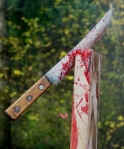 Vegetarians and tender souls, avert your eyes.
Vegetarians and tender souls, avert your eyes.
Sometimes, when you live on a farm, you become an angel of mercy.
Friends of ours, who also have a small acreage, are far too sympathetic to the members of their chicken flock to dispatch them when they are in need of it. A couple of times now we’ve had to respond to emergency medical matters by delivering the coup de grâce for them. This afternoon we had a distressed phone call. Would we take their fine, though obnoxious, Wyandotte cock, and kill him? He’d been found flopping about in the morning with a broken leg.
Naturally, we are only too happy to help out. Though Richard usually ends up doing the killing around here, even I can put down an animal in distress. In this case, the lovely 7-month bird was also to be ours to keep for the table. He arrived nicely settled into grass in a ventilated box. We visited briefly with his parents, and then excused ourselves to take him away to the back of behind. The stroke was swift. Since we’d had advance notice of his arrival, a pot of hot water was ready for his dunking. He plucked beautifully and very shortly was ready to be cleaned inside.
Now he looks less like a bird to engage your heart and more like what comes from the market. He had a very good life, however, unlike the chickens wrapped and displayed in that supermarket cooler, and he’ll make a far healthier several dinners for us, too. We’ll let him rest for a couple of days in the refrigerator, “hanging” used to be term for it, and then we’ll bring him in for preparation.
The gift rooster was the wrap-up of a fine weekend. The weather has been autumnally gorgeous: sunshine, mild air, foliage in color. I drove off across the valley with a friend on Saturday and came home with another beautiful Jacob sheep for the flock. This is Bide a Wee Ida:
Ida is a yearling ewe, and arrived just in time to step into the breeding paddock with Eldon the ram and the other women. Ordinarily I would quarantine a new ewe for a period before introducing her to the flock. But Ida has effectively been in quarantine at Bide a Wee Farm since the Oregon Flock and Fiber Festival in September, so I wasn’t concerned about her.
Eldon seemed quite pleased to make her acquaintance, and Ida, too, appeared receptive to the matter. A ram follows an interesting ewe closely, sniffs her personal cologne at intervals, and curls his lips in delight. He licks his nose, and advances for another whiff. He bumps her hips lightly, and speaks, I am quite sure, French into her ear: You are so beautiful, my sweet. I do very much adore you. Your scent causes me rapture. Come close again, don’t go, my dear. Am I not handsome to you? Meanwhile, the ewe plays a coy game. If she is not in the mood yet (meaning, not ready to breed), she trots ahead of him, turns irritably away, and keeps him running along behind. If she is open to the moment, however, she will pause now and then to let him come close. She’ll squat ahead of him, and maybe pee a little. He raises his front leg and rests his chin on her rump. Oh, dear, she thinks, and sets off again for another pass around the paddock, but not so fast he might lose interest. This little dance goes on for a while, until they come to an agreement about one another. Then he steps up to the job, commits the act in a trice, and walks off to investigate some other woman in sight. To judge from the indications given last night, Ida was no longer a virgin by dawn.
Ida had an adventure in arriving here. When I brought Jenna home in the back of the car last December I was a little unnerved by the clacking of her horns against the windows. So this time we thought about the matter a little, and decided that, since you hood a hawk to calm it, and blinder a horse, why not cover the eyes of a sheep to keep her from trying to get out the windows? We took along a pillowcase and, once Ida was loaded into the car, slipped it over her head. We cut a corner off the case to make a breathing hole. Ida seemed to be all OK with the matter. She stood quietly all the way down the hills from the farm, through Newberg (where we stopped for coffee at a little coffee shack and amazed the server who looked in the window and asked if we wanted a dog biscuit. “I think she’d love it,” I said, “but it’s a sheep.” “No way!” said the girl. “Way! It is!”, and withdrew the offer of the doggie biscuit), across the valley, and up into the east-side hills to home. Except for the loss of the dog biscuit, Ida was untroubled. One wonders in passing, did she notice we had a pillowcase over our dog’s head?
Sunday dawned as beautiful as Saturday had. I took advantage of the weather to clean out the chicken nests. This might not sound like a pleasing task, but it doesn’t take long, and doing it in sunshine is so much more pleasant than doing it in the rain, that, yes, I enjoyed it.
I went into the loft and tossed bales of hay to the floor, and watched the bits and flecks of hay dust drift in the sunlight. I tied the ladder to the roof truss, too. Why? Indeed.
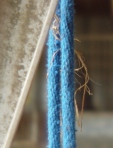 Let me tell a small story. A couple of weeks ago I went up to throw down bales. It was my first trip up the ladder this year. I’ve just now used up the hay stacked on the floor of the barn, and had to move upstairs for more. The first bales to come down are always a little scary to deal with. They’re stacked to the very edge of the loft floor, so must be hooked from the stack by clinging to the ladder and coaxing them out. Then, once a bale-sized rectangle of floor is exposed, I can step off the ladder and, by turning smally in the rectangle, shove the next bales off into space. The first part of this worked fine. I’ve done it before and have a pretty good method worked out. I didn’t worry too much about the second part. By then I’m standing on the floor. No problem. Except… the second bale down elegantly takes the ladder with it.
Let me tell a small story. A couple of weeks ago I went up to throw down bales. It was my first trip up the ladder this year. I’ve just now used up the hay stacked on the floor of the barn, and had to move upstairs for more. The first bales to come down are always a little scary to deal with. They’re stacked to the very edge of the loft floor, so must be hooked from the stack by clinging to the ladder and coaxing them out. Then, once a bale-sized rectangle of floor is exposed, I can step off the ladder and, by turning smally in the rectangle, shove the next bales off into space. The first part of this worked fine. I’ve done it before and have a pretty good method worked out. I didn’t worry too much about the second part. By then I’m standing on the floor. No problem. Except… the second bale down elegantly takes the ladder with it.
I consider the matter. I am upstairs with a lot of hay and not a lot of room to move around. The ladder is downstairs. I try to think like McIver. I have tools. I have: a hay hook. I have: clothes. I have: a very, very small Swiss Army knife with a nail file and a scissors in addition to the manicure-sized blade. I can think of no way to use any of these things to get the ladder back.
So I start tossing bales onto the floor. I’m thinking, if I stack up enough of them down there, I can hop down onto them. The first couple land neatly where I intend. The next few bounce, fly, roll, and cannonball everywhere. They are scattered all over the floor, not even one on top of another very exactly. This is not working. I have more bales on the floor than I really want down there, and I am still up in the loft with no good way to join them. But I do have enough space cleared on the edge of the loft now that I can lie down there. I lean wa-a-ay out with the hay hook, and just snag the top of the aluminum ladder, and pull gratefully on it.
This is an extension ladder. Pulling on the top only makes it longer and longer and doesn’t really put it anywhere I want it. By this time I am sweating as in August, have shucked off my chore coat, am not admiring the motes in the sun anymore, and might even have said the “F” word: “Fooey!”
As I am writing this in comfort, and at a computer, you must know I did in the end get out of the loft. I struggled with that ladder for a good 20 minutes, making it “walk” from side to side and trying to find a place among all the shattered bales below to set its feet. I hugged the center post of the barn as I slithered down the wobbly rungs. I stamped about a little, restacked the bales, picked up my coat and hat, and snarled at the sheep who were watching it all in fascination.
So, y’know, tie your ladder.
The sun was still up, and I needed to make a gathering of greens for holiday wreaths. One of the things about having almost everything in storage is, you can’t easily remember if you were smart enough to save out things like hand nippers and branch loppers. I was, and was able to find them even, so set out to gather some leafy things into buckets. I’ll be making gift wreaths for the next few weekends. I started with one this afternoon, working in the sun on the back steps.
When I came in, Richard took one look and me and said, as he has quite a few times lately, “You really need a new coat.”
I don’t see the problem myself. It’s hardly broken in. It still has two working buttons. What? It’s the coat that held new-born lambs. It goes over fence wires to protect me. It has good pockets for apples and bottles of animal medicines. It’s softened up. It fits over sweaters. It’s taken me a good 10 years to make this coat what it is. You mean, I have to start again at the beginning?
Well, I’ll give that some thought.
Meanwhile, this is the kind of weekend that makes me love autumn most.
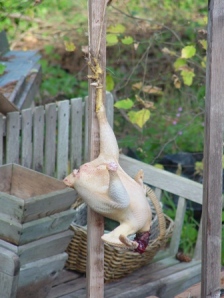
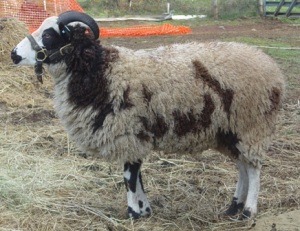
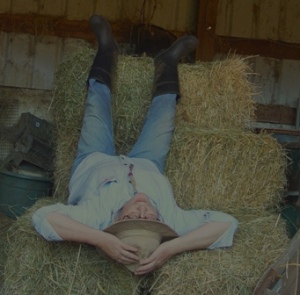
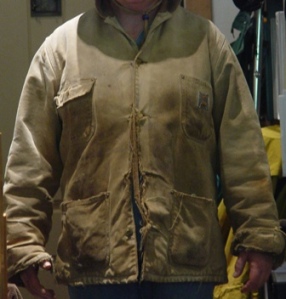
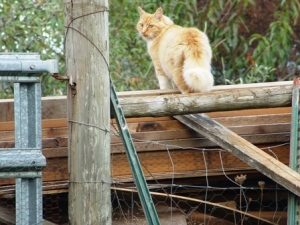
So…I’ve been addicted to this site for quite a while now. I’m constantly fascinated by all you do and know. Congratulations on the success of the campaign for the county library.
What is Richard doing while you’re having your adventures?
Kathy
As little as I can get away with.
I had an argument with Eldon about who was going to service the ewes this fall. He won by hitting me on the side of the knee that was most firmly mired in mud. I’m very slow getting around of late and hope that I don’t have to have something serious done after I get the upcoming construction chores finished.
In the meantime, we do have a house of our own design under construction about 20 feet from where we hang out during the day. I’m on call, in part because I know what’s supposed to happen, because I want to help make it happen (frowned on by most of the sub-contractors and only reluctantly agreed to by the General Contractor when he found he couldn’t get anyone else to do some of the work). Among other things, there are some serious liability questions if one of them hurts me or if I hurt one of them.
So far, everything Susan and I have done has been finished on time and to spec. Even more importantly, the things we’ve done have worked the way they were supposed to.
I’m gradually getting a reputation for having some idea of what I’m doing, cemented this afternoon by the most unlikely attempts, when I got the small gravel compactor to work when no one else could. Susan will attest, my expertise with small engines is limited to 1) pound on it (which I couldn’t do to someone else’s equipment) or 2) take it apart and put it back together just the way you found it and hope for the best.
Other than that, I do most of the cooking.
ry